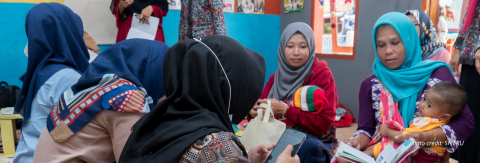The coronavirus disease 2019 (COVID-19) pandemic has made the situation more challenging for those who need to access maternal and child health (MCH) services in Kabupaten (District of) Manggarai Barat. Even though the number of COVID-19 confirmed cases in this region was less than 75 throughout 2020, the regional government still implemented public activity restrictions. Health facilities must also observe the regulation; integrated health service posts (posyandu1) temporarily stopped operating and services at various health facilities were very limited. With support from Knowledge Sector Initiative (KSI), The SMERU Research Institute conducted a study to measure the decline in the nutrition and MCH service achievement and the challenges faced by the Government of Kabupaten Manggarai Barat during the COVID-19 pandemic. The study used a qualitative approach through in-depth interviews with pregnant women and mothers of newborns and under-fives—hereafter women, community figures, posyandu cadres, healthcare workers, and Kabupaten Manggarai Barat Health Agency’s staff members and officials. To support its qualitative findings, the study also analyzed data on nutrition and MCH routine visits and conducted an online survey.
The study discovers that there is a decline in the nutrition and MCH service achievement during the COVID-19 pandemic. Women have been reluctant to visit health facilities for fear of contracting the virus. As the pandemic has also affected people’s economy and household welfare, money becomes an issue for women, especially in relation to seeking healthcare services. Moreover, there are structural challenges that have existed even before the pandemic, i.e., the women’s weak understanding, insufficient support from the family, the difficulty of accessing certain areas, and the tradition that makes it hard for the women to visit health facilities. During the pandemic, educational activities have been limited to prevent crowds and lower the risks of COVID-19 transmission. At the same time, the communication style of healthcare workers to the people has not been able to promote sustainable changes in people’s behavior.
Based on findings of the study, we developed three policy briefs according to the types of services: pregnancy care, delivery and postpartum care, and healthcare services for babies and children under five. In general, the recommendations of these policy briefs are focused on improving education for the women, their families, and the community by using the behavior change communication strategy and involving village-level driving actors, bringing MCH services closer to the women, and ensuring that more people participate in the National Health Insurance-Healthy Indonesia Card (JKN-KIS2) program. There is also a need to ensure that more health facilities become partners of the Health Social Security Implementing Agency (BPJS3 Kesehatan). Improving data collection and program administration and strengthening technology-based innovation for MCH services also need to be done immediately, along with an expansion of internet coverage.




